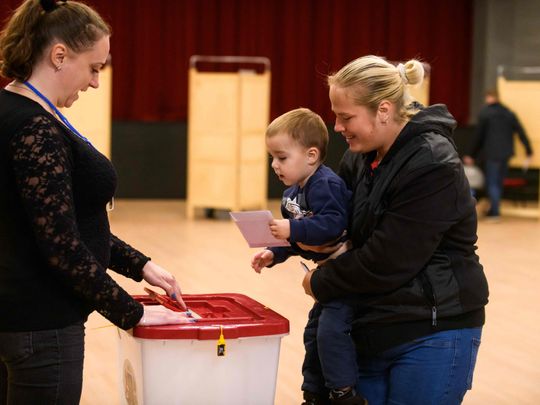
HELSINKI: Neighbouring Russia’s attack on Ukraine helped shape the general election held on Saturday in Latvia, where divisions among the Baltic country’s sizeable ethnic-Russian minority are likely to influence the makeup of parliament and war-induced energy concerns will preoccupy the next government.
Several polls showed the centre-right New Unity party of Prime Minister Krisjanis Karins emerging as the top vote-getter, with up to 20 per cent support.
Karins, who became head of Latvia’s government in January 2019, currently leads a four-party minority coalition that along with New Unity includes the centre-right National Alliance, the centrist Development/For!, and the Conservatives.
A total of 19 parties have over 1,800 candidates running in the election, but only around eight parties are expected to break through the 5 per cent threshold required to secure a place in the 100-seat Saeima legislature.
Karins, a 57-year-old dual Latvian-US citizen born in Wilmington, Delaware, told Latvian media outlets that it would be easiest to continue with the same coalition government if New Unity wins. He has excluded any cooperation with pro-Kremlin parties.
Support for parties catering to the ethnic-Russian minority that makes up over 25 per cent of Latvia’s 1.9 million population is expected to be mixed” a share of loyal voters have abandoned them - for various reasons - since the war.
The election is likely to be the death knell for the opposition Harmony party, the popularity of which has steadily declined.
The Moscow-friendly party traditionally served as an umbrella for most of Latvia’s Russian-speaking voters, including Belarusians and Ukrainians. In the 2018 election, Harmony received almost 20 per cent of the vote, the most of any single party, but was excluded by other parties from entering the government.
However, Harmony’s immediate and staunch opposition to the Russian attacks on Ukraine caused many voters who still back Russian President Vladimir Putin to desert it. Those opposed to the war, meanwhile, have tended to move toward Latvia’s mainstream parties, all of which also took positions against the war.
A recent poll by Latvian public broadcaster LSM showed Harmony trailing in fifth place with 5.1 per cent support.












